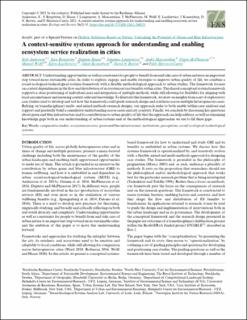A context-sensitive systems approach for understanding and enabling ecosystem service realization in cities
| dc.contributor.author | Andersson, Erik | |
| dc.contributor.author | Borgström, Sara | |
| dc.contributor.author | Haase, Dagmar | |
| dc.contributor.author | Langemeyer, Johannes | |
| dc.contributor.author | Mascarenhas, André | |
| dc.contributor.author | McPhearson, Timon | |
| dc.contributor.author | Wolff, Manuel | |
| dc.contributor.author | Łaszkiewicz, Edyta | |
| dc.contributor.author | Kronenberg, Jakub | |
| dc.contributor.author | Barton, David Nicholas | |
| dc.contributor.author | Herreros-Cantis, Pablo | |
| dc.date.accessioned | 2022-03-23T12:34:12Z | |
| dc.date.available | 2022-03-23T12:34:12Z | |
| dc.date.created | 2021-06-25T08:37:08Z | |
| dc.date.issued | 2021 | |
| dc.identifier.issn | 1708-3087 | |
| dc.identifier.uri | https://hdl.handle.net/11250/2987107 | |
| dc.description.abstract | Understanding opportunities as well as constraints for people to benefit from and take care of urban nature is an important step toward more sustainable cities. In order to explore, engage, and enable strategies to improve urban quality of life, we combine a social-ecological-technological systems framework with a flexible methodological approach to urban studies. The framework focuses on context dependencies in the flow and distribution of ecosystem service benefits within cities. The shared conceptual system framework supports a clear positioning of individual cases and integration of multiple methods, while still allowing for flexibility for aligning with local circumstances and ensuring context-relevant knowledge. To illustrate this framework, we draw on insights from a set of exploratory case studies used to develop and test how the framework could guide research design and synthesis across multiple heterogeneous cases. Relying on transdisciplinary multi- and mixed methods research designs, our approach seeks to both enable within-case analyses and support and gradually build a cumulative understanding across cases and city contexts. Finally, we conclude by discussing key questions about green and blue infrastructure and its contributions to urban quality of life that the approach can help address, as well as remaining knowledge gaps both in our understanding of urban systems and of the methodological approaches we use to fill these gaps | en_US |
| dc.language.iso | eng | en_US |
| dc.subject | comparative studies | en_US |
| dc.subject | ecosystem services | en_US |
| dc.subject | green and blue infrastructure | en_US |
| dc.subject | institutions | en_US |
| dc.subject | perceptions | en_US |
| dc.subject | social-ecological-technological systems | en_US |
| dc.title | A context-sensitive systems approach for understanding and enabling ecosystem service realization in cities | en_US |
| dc.type | Peer reviewed | en_US |
| dc.type | Journal article | en_US |
| dc.description.version | publishedVersion | en_US |
| dc.rights.holder | © 2021 The Authors | en_US |
| dc.source.volume | 26 | en_US |
| dc.source.journal | Ecology & Society | en_US |
| dc.source.issue | 2 | en_US |
| dc.identifier.doi | 10.5751/ES-12411-260235 | |
| dc.identifier.cristin | 1918358 | |
| cristin.ispublished | true | |
| cristin.fulltext | original | |
| cristin.qualitycode | 1 |
Tilhørende fil(er)
Denne innførselen finnes i følgende samling(er)
-
Publikasjoner fra CRIStin - NINA [2314]
-
Scientific publications [1342]
Vitenskapelige artikler, kapitler og monografier i Open Access.
